 Petzlover
Petzlover Catahoula Cur is originated from United States but Appenzell Mountain Dog is originated from Switzerland. Catahoula Cur may grow 15 cm / 6 inches higher than Appenzell Mountain Dog. Catahoula Cur may weigh 16 kg / 36 pounds more than Appenzell Mountain Dog. Both Catahoula Cur and Appenzell Mountain Dog has same life span. Catahoula Cur may have more litter size than Appenzell Mountain Dog. Catahoula Cur requires Low Maintenance. But Appenzell Mountain Dog requires Moderate Maintenance
Catahoula Cur is originated from United States but Appenzell Mountain Dog is originated from Switzerland. Catahoula Cur may grow 15 cm / 6 inches higher than Appenzell Mountain Dog. Catahoula Cur may weigh 16 kg / 36 pounds more than Appenzell Mountain Dog. Both Catahoula Cur and Appenzell Mountain Dog has same life span. Catahoula Cur may have more litter size than Appenzell Mountain Dog. Catahoula Cur requires Low Maintenance. But Appenzell Mountain Dog requires Moderate Maintenance
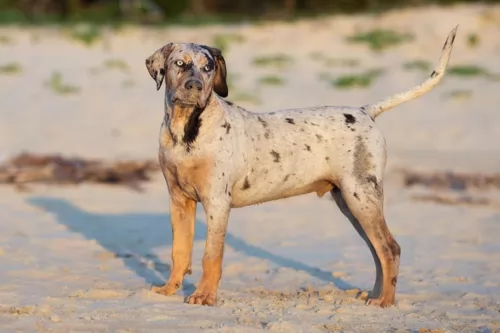 The Catahoula Cur is also known as the Catahoula Leopard Dog or the Louisiana Catahoula. The dog hails from Louisiana, United States.
The Catahoula Cur is also known as the Catahoula Leopard Dog or the Louisiana Catahoula. The dog hails from Louisiana, United States.
It is thought that the Catahoula Cur or Catahoula Hound as it is also known, used to be a hunting dog. The first settlers in Louisiana needed a strong dog to help them with hunting wild hogs and they bred their dogs with other dogs belonging to the locals. This gave them a strong, resilient dog that could take on the wild hogs and also protect their livestock.
Dogs who have no doubt been brought into the mix to produce the Catahoula Cur are mastiffs, Beaucerons, sighthounds and wolves.They are today more commonly referred to as Catahoula Leopard Dogs.
 Hailing from the Appenzell region of Switzerland and known as the Appenzeller Mountain Dog or the Appenzeller Sennenhunde, this athletic breed of dog has a history which is debatable and which has several theories.
Hailing from the Appenzell region of Switzerland and known as the Appenzeller Mountain Dog or the Appenzeller Sennenhunde, this athletic breed of dog has a history which is debatable and which has several theories.
It is believed the dog is descended from Molossus.The Appenzeller Mountain Dog is one of the 4 recognized Swiss Sennenhunds, appearing to have descended from cattle dogs. The first breed club was founded in 1906 by Albert Heim. However, an early reference to the breed's predecessors was made in a book of 1853, where it refers to dogs in the Appenzell region.
In 1898 the Appenzeller Mountain Dog was shown at the first international dog show and was recognized internationally as a separate breed in 1989.
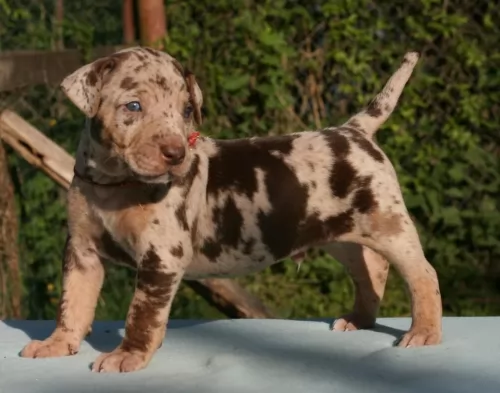 There are varying sizes for Catahoulas and a typical height is 51–66cm and weighing anything from 18 – 51kg. These Cathoula Cur’s come in different colors too, but the leopard-like coat is a dominant feature with this dog.
There are varying sizes for Catahoulas and a typical height is 51–66cm and weighing anything from 18 – 51kg. These Cathoula Cur’s come in different colors too, but the leopard-like coat is a dominant feature with this dog.
While there are solid colors, you can expect red- and blue merle, grey-, black, patchwork and brindle too.
The length of the coat varies somewhat too and while the coat is essentially short and smooth, there are Catahoulas where the coat is a little longer and more coarse.
The eyes of the Catahoula Cur are another interesting feature and both eyes can be the same color, but in some instances the one eye can be brown while the other could be blue, green or gray. The ears of the Catahoula Cur are medium in size and are floppy, dropping down close to the head.
The Catahoula Cur is an intelligent dog and also active and full of sports. You can’t call this dog aggressive, but merely assertive, being strong-willed. He is also affectionate and loyal, loving to spend time with his human family.
He makes a wonderful family pet, complete with children as well as other pets in the home, more so when he has been trained and socialized. These dogs are bright and alert and they also make excellent watch dogs. People who have owned a Catahoula Cur will tell you that these are wonderful pets, full of life and personality.
 The Appenzell Mountain Dog is a medium-sized dog standing at between 47–58cm at the withers and weighing in at 22–32kg.
The Appenzell Mountain Dog is a medium-sized dog standing at between 47–58cm at the withers and weighing in at 22–32kg.
He is a heavy-built dog and sports a tri-color coat – black, tan and white. He has a double coat with the topcoat being shortish, thick and straight. He sheds throughout the year and isn’t hypoallergenic. He has small ears which are high set and which are floppy. The tail is long and curls when held high.
The Appenzell is an active breed who has been used to herding, fetching and working. Because of his energy levels, he won’t fit in well in a small home where his energy needs can’t be met. However wherever he is, he bonds closely with his human family and thrives on attention from them.
He isn’t known as an aggressive dog, but if as a working breed, he felt that the livestock he was guarding was under threat, he could exhibit some aggressiveness.
He gets on well with children in the home and other pets but is inclined to be wary of strangers. Just as with any other dog, training and socialization does wonders for him, making him relaxed and obedient around people and dogs.
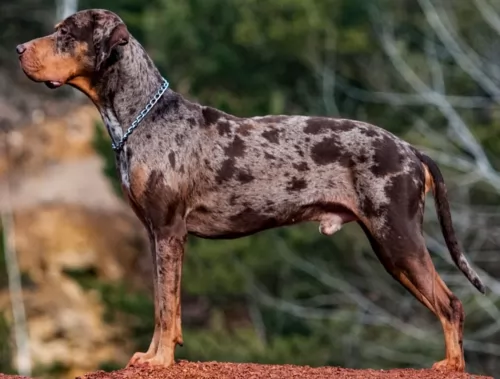 Catahoula dogs are the kind of dogs that make perfect family pets as they are all rounders. They’ve got characteristics that everybody wants in a dog. They are naturally protective, even they are not described as aggressive dogs. With training and socialization they get on well with children as well as other pets in the home. He is alert and territorial, which makes him a good watchdog, more so because he doesn’t particularly like strangers.
Catahoula dogs are the kind of dogs that make perfect family pets as they are all rounders. They’ve got characteristics that everybody wants in a dog. They are naturally protective, even they are not described as aggressive dogs. With training and socialization they get on well with children as well as other pets in the home. He is alert and territorial, which makes him a good watchdog, more so because he doesn’t particularly like strangers.
Intelligent and independent, training makes him wonderfully obedient and relaxed. However, give him the chance for ball games and a walk, and he is more than ready.
He is used to being a guard- and hunting dog, and this makes him an active, energetic dog. You will need to give him plenty of activities if you don’t want this amicable dog becoming anxious, frustrated and destructive.
Exercise him well, provide him with nourishing, top quality food together with fresh water and shower him with the love and attention he deserves as a family member. You’ll also join the ranks of Catahoula Cur owners who want to tell others about what an awesome pet he makes.
 Herding dogs tend to be independent and somewhat reserved but the Appenzell Mountain Dog is social, outgoing and loving with his human family. When trained and socialized he gets on well with other pets as well as children in the home.
Herding dogs tend to be independent and somewhat reserved but the Appenzell Mountain Dog is social, outgoing and loving with his human family. When trained and socialized he gets on well with other pets as well as children in the home.
He is a working dog, and thrives on being active, so a good amount of exercise will be necessary. He is a courageous, affectionate dog and when you give him the right upbringing and treat him as he deserves to be treated, he becomes a splendid pet.
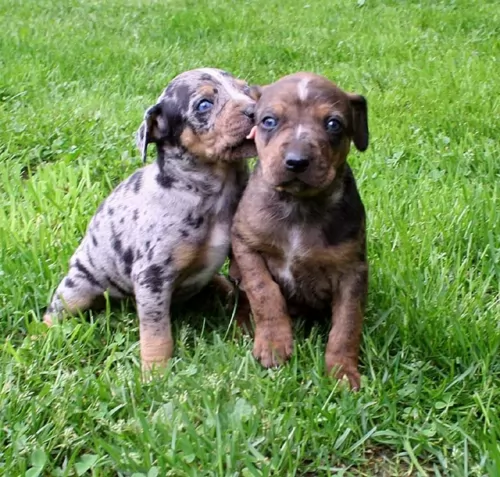 When you buy a Catahoula Cur, you can know that your pet is going to be fairly healthy, however there will be some common health issues to look out for, and by knowing about these health concerns, you can be better prepared.
When you buy a Catahoula Cur, you can know that your pet is going to be fairly healthy, however there will be some common health issues to look out for, and by knowing about these health concerns, you can be better prepared.
Your Catahoula Cur will be susceptible to some bacterial and viral infections which can be life threatening for him if he gets them. Some of these are parvo, distemper and rabies. That is why it is important to have your pet vaccinated, which can start at about 8 weeks of age for a puppy.
Obesity is a world-wide problem with humans and with their pets and it can open up a whole lot of problems with your pet’s health that he otherwise might not have got. It can play havoc with your pet’s digestion, and it can cause joint problems too.
It can be so tempting to pop a sweet treat into your pet’s mouth because you love him so much, but get to know what foods can actually be hazardous for him.
 There are some health problems with dogs which are inherited. It is why some people insist on getting certificates from breeders to show that the parents were cleared of certain diseases such as hip and elbow dysplasia.
There are some health problems with dogs which are inherited. It is why some people insist on getting certificates from breeders to show that the parents were cleared of certain diseases such as hip and elbow dysplasia.
Certainly, it’s a known fact that many health problems can be prevented by the way you feed your dog and the way you raise him.
If you suspect your pet is suffering with an ailment that is making him lethargic and run-down, get him to the vet immediately.
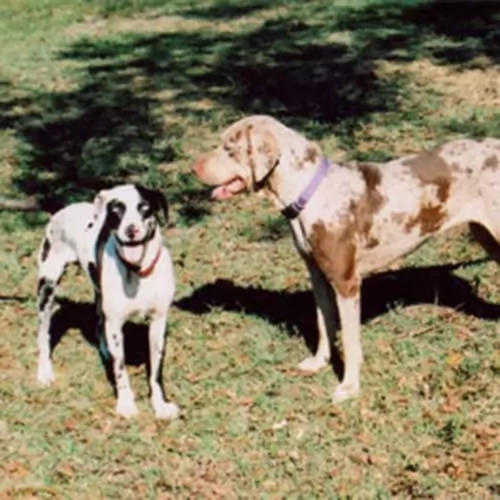 Your Catahoula Cur isn’t a high maintenance dog and a good brushing 2 times a week will keep his leopard coat looking shiny and free of loose hairs.
Your Catahoula Cur isn’t a high maintenance dog and a good brushing 2 times a week will keep his leopard coat looking shiny and free of loose hairs.
Catahoula’s have good teeth, and you want to keep them that way by brushing them at least 2 or 3 times a week to prevent dental decay and a host of other medical issues.
 You want your Appenzell Mountain Dog to maintain his thick shiny coat, and because he sheds throughout the year, a good brushing twice a week will benefit him.
You want your Appenzell Mountain Dog to maintain his thick shiny coat, and because he sheds throughout the year, a good brushing twice a week will benefit him.
Dogs with hanging ears, such as this dog, are always more prone to ear infections, requiring more attention to the inside of the ears. Clean, dry ears resist ear infections.
The Appenzeller is a working dog, used to being active all day, so he will require a lot of exercise. He just loves being outdoors, and while he adapts to city- and country life, he will prefer living in the country. Take him for walks, play ball with him and allow him to run with you when you go jogging or cycling.
A young adult Appenzeller Sennenhunde will require a different calorie intake compared to a dog that has been spayed or neutered or a puppy that is still growing. You need to watch your dog’s age, his size and the particular season of his life he is in and adjust his food intake.
Kibble is good and well, and there are excellent brands packed with nutrients, but your furry friend will require brown rice, vegetables and cooked chicken mixed into his kibble from time to time as well as raw meat added in when possible.
An excellent diet is important for the wellbeing of your pet, and always ensure that fresh, cool water is available.